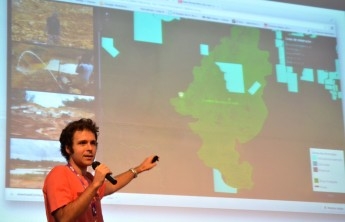
ICFJ Knight Fellow Gustavo Faleiros presenting on InfoAmazonia at the 2013 Campus Party Brasil conference.
A new report by the Center for International Media Assistance (CIMA) highlights former ICFJ Knight Fellow Gustavo Faleiros’ contributions to the critically important field of environmental journalism.
Though experts predict climate change will have a growing impact on the global economy in decades to come, the report points out that media worldwide largely neglect to educate the public about its consequences.
“Mainstream news organizations tend to focus a lot on politics, crime, entertainment and sports,” ICFJ Vice President of Programs Patrick Butler explains in the report. “When there are programs that focus on issues like health and the environment, you get a rolling of the eyes about donor-driven agendas at some news organizations. You still have to convince the media organizations that…this is a topic worth covering.”
Gustavo Faleiros, who was an ICFJ Knight Fellow from 2013 to 2014, forged a unique blend of data journalism and environmental journalism—which he refers to as “geojournalism”—to tell stories about the environment.
During his fellowship, he built InfoAmazonia, a website that monitors the Amazon region in real time by pulling together data from NASA satellites and a variety of other sources and displaying it on a map.
The CIMA report points out that Faleiros has shared the code for JEO, the interface powering InfoAmazonia, for free online so that other journalists can build upon and modify it for their own environmental reporting projects.
InfoAmazonia and JEO aren’t the only tools that Faleiros produced during his ICFJ Knight Fellowship, however.
The CIMA report emphasizes the impact of Ekuatorial, CartoChaco and other Faleiros creations that map natural disasters, coral reef destruction, deforestation and other environmental menaces occurring elsewhere in Latin America and as far away as Indonesia.
For journalists not sure where to get started when reporting on the environment and climate change, Faleiros also authored the Geojournalism Handbook during his ICFJ Knight Fellowship to guide them.
“The idea is to share knowledge and make projects easier to replicate,” Faleiros explains in CIMA’s report.
Interested in learning more about the work of Gustavo Faleiros and how the news media can better cover environmental issues worldwide?
Read the full CIMA Report here.
Photo: CC-Licensed, thanks to Fernanda Luz on Flickr.